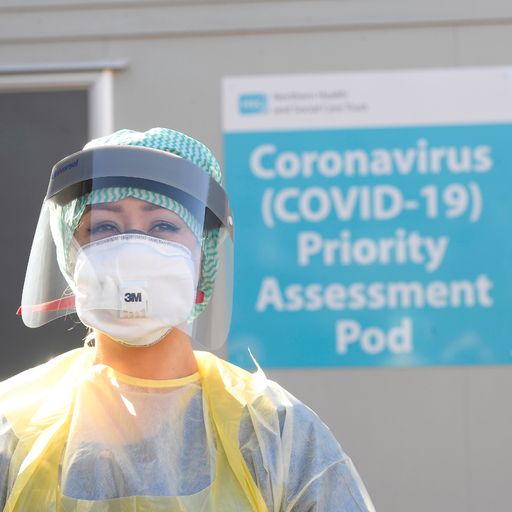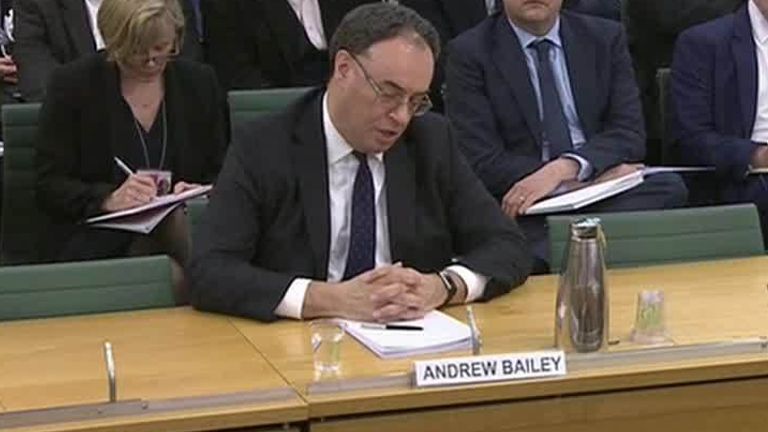Coronavirus: Price controls considered in UK to stop hikes in virus essentials
Retailers are urged to behave responsibly in setting prices as Mark Carney gives an update on virus aid for the economy.
Thursday 5 March 2020 19:13, UK
The competition regulator is considering whether to advise the government that price controls may be needed to prevent coronavirus outbreak profiteering.
The Competition and Markets Authority (CMA) made its announcement hours after the banking sector revealed it was offering help to customers as growing virus disruption threatens payment deadlines.
Meanwhile, the governor of the Bank of England has reiterated that collective action being planned with the Treasury to support the economy would have "maximum impact" if deployed.
The CMA said it was urging retailers "to behave responsibly" in their pricing of goods and not exploit the evolving COVID-19 situation.
The statement threatened enforcement action against firms charging excessive prices - adding that those making "misleading claims about the efficacy of protective equipment" would also be targeted.
Members of the public selling on online marketplaces were also warned against charging inflated prices and urged to act responsibly.
Price controls have not been contemplated in the country since the 1960s.
It was earlier revealed that banks could increase overdrafts or allow repayment relief for mortgages to help those "directly or indirectly" impacted by COVID-19.
Lenders will also offer support to small and medium sized businesses that are affected, industry body UK Finance said.
Bank of England governor Mark Carney had already said that the economic shock to the UK caused by the outbreak "could be large" and figures out earlier this week suggest it is already putting the brakes on growth.
He built on those remarks in a speech at University College London on Thursday evening, saying the Bank's rate-setting committee was assessing various scenarios and considering the policy implications.
In other words, no decisions have been taken.
Andrew Bailey, who will succeed him at the Bank later this month, told MPs on Wednesday that companies could soon expect help to mitigate the impact of supply chain disruption through coordinated action with the Treasury.
UK Finance, which represents more than 250 firms across the financial sector, outlined how lenders could support people affected.
Chief executive Stephen Jones said: "Banks, building societies and credit card providers understand that some of their customers may be worried about the effect that contracting the coronavirus (COVID-19) could have on their finances, for example due to a drop in income or because of unexpected expenses or bills to pay.
"All providers are ready and able to offer support to their customers who are impacted directly or indirectly by COVID-19, which could include offering or increasing an overdraft or allowing repayment relief for loan or mortgage repayments: asking for help early is key."
He added that banks and other finance providers also "recognise that the cashflow of small and medium sized businesses may be disrupted by the coronavirus impacts".
Mr Jones said lenders were "committed to supporting viable businesses in continuing to trade while they implement their contingency plans".
:: Listen to the Daily podcast with Dermot Murnaghan on , , ,
The intervention comes a day after an announcement by Boris Johnson that workers who need to self-isolate due to the virus will be eligible for sick pay from the first day they are off - rather than from the fourth day as in normal cases.
On Thursday the CBI, the business lobby, called for further reforms to statutory sick pay, among them that it should be extended to all workers - including agency staff and those on zero-hours contracts - who self-isolate in accordance with public health guidance.
Meanwhile, financial markets continue to suffer turbulence as a result of the outbreak.
Last week, global stocks suffered their worst falls since the financial crisis on fears about the virus's economic impact.
Shares have shown some recovery in recent days, bolstered by the decision of the US Federal Reserve to implement an emergency interest rate cut in the world's biggest economy.
But on Thursday there were further declines on the FTSE 100, which was down by 110 points or 1.6% at the the close - ending the day at 6705.
It means it is almost 10% down over the last 10 days.
Other European markets and US stocks endured similar losses.
Financial analysts cited a new round of jitters over the speed of COVID-19's spread.









